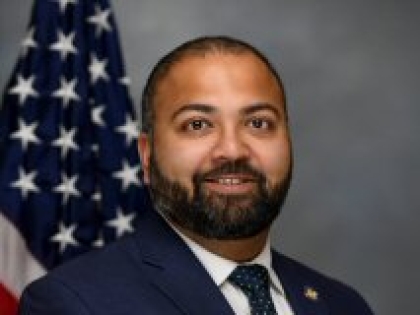
State officials, Hempstead board members vow to work together on bill

State authorities and Hempstead school leaders, who have sniped at each other persistently in recent weeks, came together Thursday in a rare showing of conviviality, vowing to work together on behalf of the troubled district’s 7,600 students.
There was even some hint that the sides might be open to compromise on proposed legislation that would establish a three-member state monitoring board for the district. Until now, the district’s five school trustees adamantly had opposed the measure.
Betty Rosa of the Bronx, who heads the policymaking Regents board, raised the subject early in the session.
"I think there's an openness to taking a look at the bill and changing the language," Rosa said.
Trustee David Gates, president of the school board, said a few minutes later that “sitting down together to revise that bill is possible.”
Gates indicated, however, that he and his fellow trustees remained leery of provisions in the bill that would allow monitors veto power over expenditures and appointment of future district superintendents, and that those provisions would have to be carefully redefined.
The remarks came during a 30-minute news conference in Hempstead’s district administration building, which turned into a bit of a "Kumbaya" moment. The comments followed private talks between school trustees, members of the Board of Regents, state lawmakers representing the area, and others.
One participant, State Sen. Kevin Thomas (D-Garden City), whose constituency includes Hempstead, told a reporter after the news conference that he was open to negotiations over the monitor bill, which he helped sponsor.
“But it depends on what they want to revise,” Thomas added. "The big thing is the monitors with veto power and, to me, that's nonnegotiable."
Overall, the session was long on optimism and short on specifics, with numerous promises from both sides to "drown out the noise" and "embrace the spirit of collaboration."
There were a few exceptions. Roger Tilles, a Manhasset resident who represents Long Island on the Regents board, said he was glad to hear specific assurances from Hempstead officials that they were restoring student music programs.
The visit Thursday could have been titled "Hempstead: the Sequel," as state education officials have been coming to the district on troubleshooting missions for years — the list of official interventions goes back to 1990 at least. Typically, such visits are in response to a combination of academic failures, funding shortages and general mismanagement.
Not that much has changed.
The upbeat news conference contrasted, for example, with a string of recent complaints from local teachers and parents of overcrowded classrooms, false fire alarms and students without completed class schedules.
On the academic side, Hempstead still does poorly. While local administrators point to a recent modest rise in graduation rates and to handfuls of graduates who go to Ivy League universities, the district's academic records suggest those success stories are the exception.
Consider the percentage of Hempstead High School students earning Regents diplomas with advanced designation. Such credentials reflect the fact that students have taken courses beyond basic requirements — for example, geometry and trigonometry — that are needed for solid college preparation.
Islandwide, more than 70 percent of high-school graduates in the Class of 2018 earned advanced Regents diplomas, according to the latest numbers released by the state Education Department.
Hempstead's figure was 11.5 percent, one of the lowest in the region. The only local districts with fewer students earning advanced diplomas were Roosevelt, with 6.6 percent, and Wyandanch, 5.1 percent.
District finances also remain shaky.
For the 2019-20 school year, Hempstead has cut about 100 staff positions, including 36 teaching slots. District officials said much of the financial squeeze is due to the fact that under state law, they must pay about $43 million in tuition this year to independent public charter schools, which have attracted hundreds of local students.
And things could get worse. A state-appointed adviser to the district, Jack Bierwirth, reported in July that Hempstead's charter-school payments would most likely rise even higher in 2020-21.
"I cannot emphasize the danger enough," Bierwirth stated.
On Oct. 2, Bierwirth stepped down after two years in his post. He has not been replaced.
Bierwirth did appear at Thursday's news conference, however, where he announced he has completed a final report on the district and submitted it to the state Education Department. Agency officials have promised to release the report, after reviewing it.
A proposed new law, passed by the State Legislature in June, would set up a monitoring board for Hempstead with powers beyond those held by Bierwirth. But Gov. Andrew M. Cuomo has not yet indicated — with schools already in their second month of classes — whether he will sign the measure.
Many outside experts view monitors as the surest guarantee that progress made in Hempstead so far won't suffer a setback.
"Look, everyone wants home rule, home rule at any cost," said Jerry Kremer, a prominent former state assemblyman who now runs a private consulting firm. "But the problems in Hempstead are so chronic that it needs oversight."
Kremer, who was interviewed earlier this week, is chairman of Empire Government Strategies, headquartered in Uniondale.
Some doubt that Albany authorities are willing to take that next step.
"Two years ago, there was a sense that this limited intervention was going to make a major difference — it hasn't," said Alan Singer, a Hofstra University education professor, in reference to Bierwirth's term.
Singer, who was also interviewed before Thursday's news conference, added, "Now state education officials also recognize that limited intervention was a mistake. But they're not prepared to intervene on a larger scale in Hempstead, because that might mean having to intervene in a number of districts across the state."
